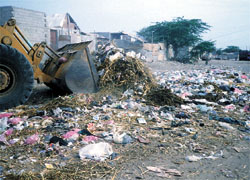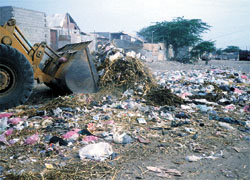
Time to Combat Environmental Pollution! [Archives:2001/09/Health]
February 26 2001
Who is going to take responsibility for environmental protection? And how to tackle pollution risks, specify diseases and effects affecting humans, animals and agriculture in Yemen due to the accelerating environmental disasters seemed to raise out of various causes? And more important, who is to compensate those affected by pollution?
Such inquires arise as a consequence of the legal file issued by Sheikhs of Mareb governorate against the Ministry of Oil and companies working in the fields of oil exploration, production and storing; these, said to be, are causes of many vital diseases spread and damaging agricultural land and animal wealth as well.
According to the file sued, works done by companies working in this field in Yemen, are resulting in negative impact on man and animals in the governorate.
While the file included proofs to show how death cases were recorded among the governorate citizens, appearances of cancer diseases of more than previous observations before oil exploration here, the sued file is considered as the first exposed to judgment. It may disclose how pollution level is high, and how much Yemen needs the UN Environment Program to deal against pollution risks in Yemen.
Yemen Environmental Problems Sources

According to the report: 20% wastes of organic materials, 2% wastes of destruction and building, 4% wastes of plastic materials and textiles, 3% wastes of glass and 14% wastes of other materials.
In another report by the council on the environmental situation in Yemen, amounts of harmful wastes are of many kinds and volumes. It’s estimated that annually there are more than 25 thousand tons of general oil wastes, 7 thousands tons of drugs, 3500 tons of refining workshop’s wastes, 200 tons of photographing workshops waste and 150 tons of insects’ annihilating materials.
Such wastes combined to defects caused by the works of the oil and exploration companies, enlarge the pollution volume; in a country that lacks sufficient circulated date assisting to clarify the environmental problems for public opinion via mass media.
Specialists report other added factors causing pollution as follows:
1- Water crises and the pollution of surface and under-ground water resources that is represented by scarcity of water and the low level of water in the underground basins due to arbitrary digging of wells; in addition to the insufficient modes of irrigation, water supply and sewerage nets.
2. Determination of land resource and planetary layer due to the deterioration of land good for agriculture, extension of desertification resulting from the wrongly fructification of wood resources, wrongly postulation, bad investment of agricultural lands and pollution dangerous materials’ increment.
3. Deterioration and pollution of urban, marine and coastal environment; wrong sewerage of irreclaimable wastes, human arbitrary activities, oily pollution caused by huge liners and arbitrary fishing of fisheries.
4. Air pollution, represented mainly in the increase of exhausts of cars in main cities, air-spreading materials caused by industrial works one of which is dust existing in air sources from cement factories.
Thus Yemeni cities observe accelerating volumes of pollution. Certainly garbage and their accumulated piles near their barrels in streets, wrongly using methods of insects’ killers and fertilizers, all affect man’s health in both agricultural regions and on products’ purchasers.
Environment Protection Responsibility
International environment structure has become protected by laws agreements and accords. In Yemen there is a law protecting environment that can be referred to solve pollution problems as well as assigning areas responsible to compensate those who deserve compensation. No doubt treating environmental problems, will help Yemen to achieve positive results leading to presence of factors improving human and natural development.
——
[archive-e:09-v:2001-y:2001-d:2001-02-26-p:./2001/iss09/health.htm]


